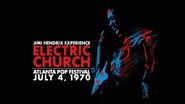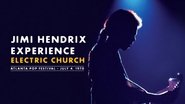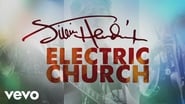lor_
A balance of interviews, appreciations and the actual 1970 Hendrix concert performance before hundreds of thousands of festival goers in a small town near Atlanta make this a quality viewing experience.I recognized Steve Rash, the successful movie director, as a participant in shooting the Hendrix stage performance in the first place, retrieved after four decades as undeveloped film gathering dust in storage.Many of the star's peers comment on the impact of Jimi on the music world at the time, plus lots of interviews with local people and officials regarding the commotion caused in their little nearby hamlet invaded by such a large-scale post-Woodstock event. The weekend concerts are cited as the end of an era, and certainly much of the innocence of the hippie and drug culture was lost thereafter.Director John McDermott has delivered an entertaining and informative package but I was a bit dismayed by some of the gee-whiz content. At one point a fellow musician who attended goes off into pure hyperbole, even giving Hendrix those nostalgia-driven superlatives (virtually dismissing John Coltrane as another legend he had caught live and belittling the comparison in favor of Hendrix) that myths are made of. Having been a fan in the '60s of both Trane and Hendrix, I was offended by this segment, typically unnecessary and misleading. Everyone is entitled to their opinions, but I continue to object to so-called documentaries in which points-of-view are spewed out to a gullible or ignorant public and given the stamp of authority by their inclusion. That's why I feel the entire "documentary" genre category is suspect, merely constituting highly selective and subjective filmmaking that usually does away with actors & the like to supposedly make it different from "fiction", or so they contend.So that leads me to conclude that perhaps Miles Davis was correct, in his well-documented disdain for criticism and analysis, wishing that the music (and his own, in particular) be left to speak for itself. Around 1966 he famously forced his record label (Columbia) to stop (at least temporarily) printing liner notes on the back of his LPs, as part of this philosophy -unheard of at the time (since liner notes were used in all genres to try and sell records with varying degrees of hype).That means this Hendrix performance should have been issued as a real musical document, without interviews, hazy memories or any other embellishments beyond the actual Hendrix footage.



